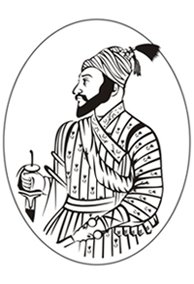On 14th June 1665 Shivaji concluded the Treaty of Purandar with Mirza Raja Jai Singh after approval of the terms by Emperor Aurangzeb. By this Treaty Shivaji had to surrender two-third of his important forts. The Treaty was a set-back to him and he had to take stock of his position vis-avis the Mughal government. But how he could do that without personally assessing the actual state of the Mughal power.
It was natural for Shivaji to feel great hesitation in agreeing to visit Agra to meet the Emperor for which Mirza Raja Jai Singh was insisting so much and was urging the Emperor with equal force to receive a visit from the Maratha hero. "Test his hearty goodwill and convert him into a powerful supporter for the peace in the southern dominion", he had urged the Emperor. Jai Singh and his eldest son, Kunwar Ram Singh, stood guarantee for Shivaji's life and safety. The visit, though not without hazards in view of Aurangzeb's known character and dubious record, offered Shivaji an opportunity to get a 'realistic' idea of the power of the Mughal Empire and held forth other opportunities as well, making it worth a trial.
After making as perfect arrangements as possible for his work being carried in his absence, Shivaji set out from Raigad on 5 March 1666, with his son Shambhaji, and a select following of officials and servants and an escort of about 4000 men, for Agra. His arrival in Agra was to coincide with the 50th lunar birthday of Aurangzeb on which occasion a grand darbar was to be held on 12th May 1666. Emperor Aurangzeb had not visited Agra after wresting the crown from his father Shah Jahan till after the latter's death and hurried and unceremonial burial on 22nd January1666.
When presented before the Emperor, the latter did not exchange a word with Shivaji who was conducted to stand in the line of the mansabdars of 5000 rank. When Khilats were presented to Maharaja Jaswant Singh of Jodhpur and two or three other nobles of high rank, Shivaji was ignored. Shivaji angrily left the Court, loudly exclaiming words of displeasure at being slighted, and refused to see the Emperor again, or accept a mansab or a khilat. There are a number of cotemporary letters in Rajasthani which describe the whole sequence of developments. Shivaji remained in Agra till 18th August in virtual confinement till he managed to regain his freedom outwitting the most wily Emperor ever to occupy the Mughal throne.
Shivaji's captivating personality, courage, manliness and the manner he had remained unaffected by the Emperor's awe and defied his authority, raised his prestige immensely. Parkaldas, the Amber State official, who was present in Agra at that time wrote "….. Shivaji is a very brave highsouled man. The people had been praising his high spirit and courage before. Now that after coming to the Emperor's presence he has shown such audacity and returned such harsh and strong replies, the public extols him for his bravery all the more".
It was natural for Shivaji to feel great hesitation in agreeing to visit Agra to meet the Emperor for which Mirza Raja Jai Singh was insisting so much and was urging the Emperor with equal force to receive a visit from the Maratha hero. "Test his hearty goodwill and convert him into a powerful supporter for the peace in the southern dominion", he had urged the Emperor. Jai Singh and his eldest son, Kunwar Ram Singh, stood guarantee for Shivaji's life and safety. The visit, though not without hazards in view of Aurangzeb's known character and dubious record, offered Shivaji an opportunity to get a 'realistic' idea of the power of the Mughal Empire and held forth other opportunities as well, making it worth a trial.
After making as perfect arrangements as possible for his work being carried in his absence, Shivaji set out from Raigad on 5 March 1666, with his son Shambhaji, and a select following of officials and servants and an escort of about 4000 men, for Agra. His arrival in Agra was to coincide with the 50th lunar birthday of Aurangzeb on which occasion a grand darbar was to be held on 12th May 1666. Emperor Aurangzeb had not visited Agra after wresting the crown from his father Shah Jahan till after the latter's death and hurried and unceremonial burial on 22nd January1666.
When presented before the Emperor, the latter did not exchange a word with Shivaji who was conducted to stand in the line of the mansabdars of 5000 rank. When Khilats were presented to Maharaja Jaswant Singh of Jodhpur and two or three other nobles of high rank, Shivaji was ignored. Shivaji angrily left the Court, loudly exclaiming words of displeasure at being slighted, and refused to see the Emperor again, or accept a mansab or a khilat. There are a number of cotemporary letters in Rajasthani which describe the whole sequence of developments. Shivaji remained in Agra till 18th August in virtual confinement till he managed to regain his freedom outwitting the most wily Emperor ever to occupy the Mughal throne.
Shivaji's captivating personality, courage, manliness and the manner he had remained unaffected by the Emperor's awe and defied his authority, raised his prestige immensely. Parkaldas, the Amber State official, who was present in Agra at that time wrote "….. Shivaji is a very brave highsouled man. The people had been praising his high spirit and courage before. Now that after coming to the Emperor's presence he has shown such audacity and returned such harsh and strong replies, the public extols him for his bravery all the more".

